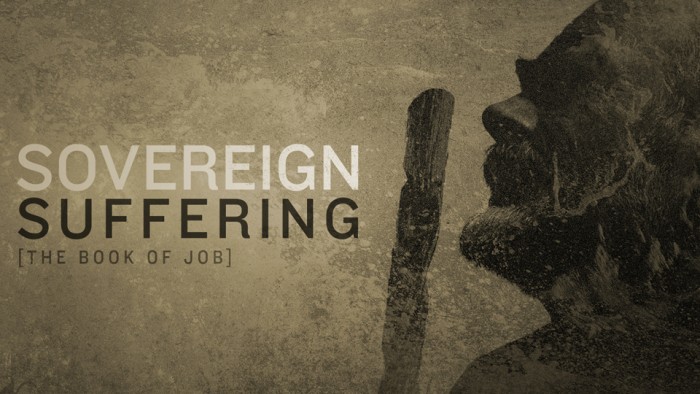
Then the Lord answered Job out of the whirlwind,
Who is this that darkens counsel by words without knowledge?
As he sat among the ash heap with his friends a fierce storm blows across the landscape and out of it pours forth the voice of God. Job has repeatedly said he wants to come to God’s courtroom to speak with the Lord, but the arrival of the whirlwind reminds us that God meets and speaks with man on his own terms.
Job has spoken confident words as if he knows the fullness of God’s governance with the world. He’s said in 12:22 that God brings “deep darkness to light” and in 9:5-6 that God brings disorder where there ought to be order. And so God challenges Job to a confrontation over words and knowledge, look at 38:3,
Dress for action like a man;
I will question you, and you make it known to me.
The language here is taken from the world of wrestling. My boys are in the stage where they like to wrestle with daddy and it’s not uncommon for one of the to cry if the wrestling match doesn’t go their way. I often will say something like, “If you want to wrestle you’ve got to tough it up.” And in many ways that’s what God is saying here to Job, “You want an answer from me? You want to teach me? Well then, man up, for here I come.”
BEHOLD THE MYSTERIOUS KNOWLEDGE OF GOD
Look at what God says in 38:4-5,
“Where were you when I laid the foundation of the earth?
Tell me, if you have understanding.
Who determined its measurements—surely you know!
Let’s not miss how stunning God’s answer is. He doesn’t offer an explanation for why Job suffers, he doesn’t give some justification for His sovereign dealings in Job’s life, instead He summons Job to an interrogation. In chapters 38-39 God asks Job a series of 43 rhetorical questions. The barrage of questions that come now in chapters 38-39 function as something like a jackhammer to Job’s soul. A spiritual jackhammer was not what Job expected to hear; God is often mysterious in speech towards men. The words from the whirlwind are not what Job wanted to hear, but what he needed to hear. Might something similar be true of your life? Could God even be speaking to you now on what you need to hear, but you are missing it because it’s not what you want to hear?
God’s 43 questions can be broken down into something like seventeen short subsections. Because we don’t have time to look at all seventeen I’m just going to break up God’s speech into it’s two basic and more general parts. The two main points Job needs to hear: 1) God is sovereign over the inanimate world (in other words, the parts of creation that don’t breathe). Notice what he says in 38:8-11,
“Or who shut in the sea with doors
when it burst out from the womb,
when I made clouds its garment
and thick darkness its swaddling band,
and prescribed limits for it
and set bars and doors,
and said, ‘Thus far shall you come, and no farther,
and here shall your proud waves be stayed’?
Did you notice the stunning word picture of how God controls the sea and darkness, two common ANE symbols of evil and chaos? He controls it like a mother controls a baby. He lets the sea burst from the womb, He wraps up the darkness in swaddling clothes, and “prescribed limits for it.” God is saying, “If I order evil in this way, do you not think I do the same with your suffering Job?” As one commentator says, “In some mysterious way even darkness is necessary to show forth the light of God’s goodness.” I wonder if you will trust God sovereignty even when evil and suffering seem to rule on this earth. Will you condemn him as impotent? Decry him as cruel? Or cling to His mysterious goodness?
God goes on to talk about his control of the morning, seas, and recesses of the deep. And notice now the questions of 38:18-21,
Have you comprehended the expanse of the earth?
Declare, if you know all this.
Where is the way to the dwelling of light,
and where is the place of darkness,
that you may take it to its territory
and that you may discern the paths to its home?
You know, for you were born then,
and the number of your days is great!
Here then is a key implication from the first part of God’s interrogation of Job: Man’s knowledge is limited. It’s a dangerous thing to presume to know what God is doing in any given situation, our knowledge is so limited, yet God knows the expanses of all the inanimate world. There is incredible mystery in this speech. And it is not cowardly to get to a point when thinking about God and say, “I’m not sure how that all works out.” The great Dutch theologian Herman Bavinck said, “Mystery is the lifeblood of dogmatics.” An infinite, incomprehensible God cannot be fully comprehended by finite minds. And that is what Job is discovering.
He goes on to say He reigns sovereign over the snow (38:22-23), rain and lightning (38:24-28), ice (38:29-30), planets and constellations (38:31-33), clouds (38:34), and then look at the amazing question of 38:35,
Can you send forth lightnings, that they may go
and say to you, ‘Here we are’?
What an incredible picture! God is saying, “Do the lightning bolts report to you each day and say, ‘Here we are, where will you send us today Job?’ No, but I give every bolt its intending destination.” There is no one like our God.
Several years ago the BBC and Discovery Channel spent five years on the most expensive nature documentary ever commissioned: Planet Earth. I’m sure many of you have seen it. The series comprises eleven episodes, each of which features a global overview of a different biome or habitat on Earth. And the images and videos are simply stunning? The animal world is more majestic and wild than anything we can imagine.
And that is exactly the point God makes in the remainder of his interrogation.
BEHOLD GOD’S MAJESTIC POWER
For God is not only sovereign over the inanimate world, but 2) God is sovereign over the animate world. And this world is wild.
In 38:39-41 God says the wild is full of predators and prey, and notice now what he says in 39:5-6,
“Who has let the wild donkey go free?
Who has loosed the bonds of the swift donkey,
to whom I have given the arid plain for his home
and the salt land for his dwelling place?
Skip down to 39:9-10,
“Is the wild ox willing to serve you?
Will he spend the night at your manger?
Can you bind him in the furrow with ropes,
or will he harrow the valleys after you?
Now look at 39:19-20,
“Do you give the horse his might?
Do you clothe his neck with a mane?
Do you make him leap like the locust?
His majestic snorting is terrifying.
Finally, see 38:26-27,
“Is it by your understanding that the hawk soars
and spreads his wings toward the south?
Is it at your command that the eagle mounts up
and makes his nest on high?
The animal world is wildly majestic and who controls all of it? The sovereign God who speaks to Job in the whirlwind. Which leads to a couple other implications for Job and us: Man’s power is limited. When compared to God’s power over all creation our power is just a drop of water in the ocean of God’s omnipotence. John Calvin wrote at the beginning of his Institutes that true knowledge of who we are only comes when we have a true knowledge of who God is. “We are led to acknowledge our frailty only when we have measured ourselves against the majesty of God,” he wrote. The question for Job, and for us, is which power will you cling to? The power that struggles to even climb a small mountain, or the power made the mountain with a word?
We also need to see from God’s interrogation that man’s wisdom is limited. Look back at 38:36-37,
Who has put wisdom in the inward parts
or given understanding to the mind?
Who can number the clouds by wisdom?
The wisdom of God is matchless compared to the wisdom of men. So, there is another question God means to storm forward in our minds: Whose wisdom will you follow?




